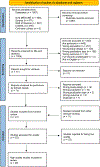Muslims and End-of-Life Healthcare in Non-Muslim Majority Nations: A Systematic Literature Review
- PMID: 38218412
- PMCID: PMC10939778
- DOI: 10.1016/j.jpainsymman.2024.01.004
Muslims and End-of-Life Healthcare in Non-Muslim Majority Nations: A Systematic Literature Review
Abstract
Context: As Muslim populations in non-Muslim majority nations grow and age, they will increasingly require culturally appropriate healthcare. Delivering such care requires understanding their experiences with, as well as preferences regarding, end-of-life healthcare.
Objectives: To examine the experiences, needs, and challenges of Muslim patients and caregivers with end-of-life, hospice, and palliative care.
Methods: A systematic literature review using five databases (MEDLINE, Scopus, Web of Science, CINAHL, Cochrane Library) and key terms related to Islam and end-of-life healthcare. Papers were limited to English-language empirical studies of adults in non-Muslim majority nations. After removing duplicates, titles, abstracts, and articles were screened for quality and reviewed by a multidisciplinary team.
Results: From an initial list of 1867 articles, 29 articles met all inclusion criteria. Most studies focused on end-of-life healthcare not related to palliative or hospice services and examined Muslim patient and caregiver experiences rather than their needs or challenges. Content analysis revealed three themes: (1) the role of family in caregiving as a moral duty and as surrogate communicators; (2) gaps in knowledge among providers related to Muslim needs and gaps in patient/family knowledge about advance care planning; and (3) the influence of Islam on Muslim physicians' perspectives and practices.
Conclusion: There is scant research on Muslim patients' and caregivers' engagement with end-of-life healthcare in non-Muslim majority nations. Existing research documents knowledge gaps impeding both Muslim patient engagement with end-of-life care and the delivery of culturally appropriate healthcare.
Keywords: Islam; community health; death; dying; minority health.
Copyright © 2024 American Academy of Hospice and Palliative Medicine. Published by Elsevier Inc. All rights reserved.
Conflict of interest statement
Similar articles
-
Interventions for interpersonal communication about end of life care between health practitioners and affected people.Cochrane Database Syst Rev. 2022 Jul 8;7(7):CD013116. doi: 10.1002/14651858.CD013116.pub2. Cochrane Database Syst Rev. 2022. PMID: 35802350 Free PMC article.
-
Patients' and caregivers' experiences of familial and social support in resource-poor settings: A systematically constructed review and meta-synthesis.Palliat Care Soc Pract. 2025 Jun 27;19:26323524251349840. doi: 10.1177/26323524251349840. eCollection 2025. Palliat Care Soc Pract. 2025. PMID: 40584974 Free PMC article. Review.
-
Sexual Harassment and Prevention Training.2024 Mar 29. In: StatPearls [Internet]. Treasure Island (FL): StatPearls Publishing; 2025 Jan–. 2024 Mar 29. In: StatPearls [Internet]. Treasure Island (FL): StatPearls Publishing; 2025 Jan–. PMID: 36508513 Free Books & Documents.
-
Community and hospital-based healthcare professionals perceptions of digital advance care planning for palliative and end-of-life care: a latent class analysis.Health Soc Care Deliv Res. 2025 Jun 25:1-22. doi: 10.3310/XCGE3294. Online ahead of print. Health Soc Care Deliv Res. 2025. PMID: 40580081
-
Early palliative interventions for improving outcomes in people with a primary malignant brain tumour and their carers.Cochrane Database Syst Rev. 2022 Jan 6;1(1):CD013440. doi: 10.1002/14651858.CD013440.pub2. Cochrane Database Syst Rev. 2022. PMID: 34988973 Free PMC article.
Cited by
-
Somebody who understands the culture and their needs that can cater for them in their retirement time: a peer research study exploring the challenges faced by British Muslims with palliative care needs during the COVID-19 pandemic.BMJ Open. 2024 Aug 8;14(8):e082089. doi: 10.1136/bmjopen-2023-082089. BMJ Open. 2024. PMID: 39122398 Free PMC article.
-
"Tie your camel first, then rely on God": reconceptualizing Javanese Islamic values to support palliative care at home.BMC Palliat Care. 2024 Mar 2;23(1):63. doi: 10.1186/s12904-024-01383-w. BMC Palliat Care. 2024. PMID: 38429709 Free PMC article.
-
Alzheimer's Disease and Related Dementias in Muslim Women: Recommendations for Culturally Sensitive Care.J Alzheimers Dis. 2024;99(3):857-867. doi: 10.3233/JAD-240064. J Alzheimers Dis. 2024. PMID: 38759011 Free PMC article. Review.
References
-
- Pew Research Center. 2015. The future of world religions: population growth projections, 2010–2050. Available from: https://www.pewresearch.org/religion/2015/04/02/religious-projections-20....
-
- Pew Research Center. 2017. U.S. Muslims concerned about their place in society, but continue to believe in the American dream. Available from: https://www.pewresearch.org/religion/2017/07/26/findings-from-pew-resear....
-
- Ghaly M, Diamond RR, El-Akoum M, Hassan A. Palliative care and Islamic ethics: exploring key issues and best practice: special report in collaboration with the Research Center for Islamic Legislation and Ethics. Qatar Foundation: World Innovation Summit for Health; 2018.
Publication types
MeSH terms
Grants and funding
LinkOut - more resources
Full Text Sources
Research Materials
Miscellaneous


